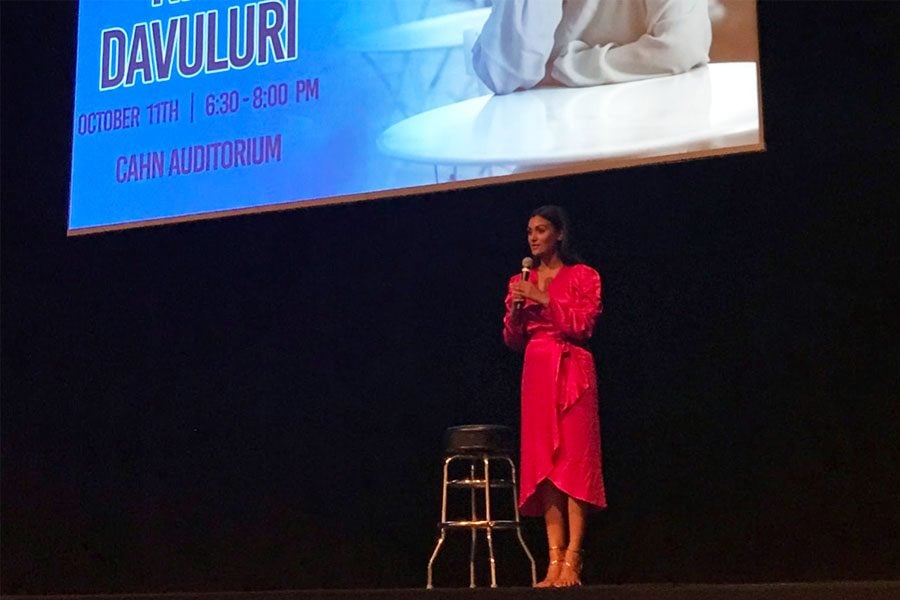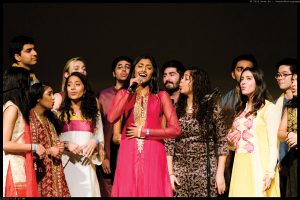‘Find something that lights you on fire’: First Indian-American Miss America discusses activism, representation
Maia Spoto/The Daily Northwestern
Nina Davuluri speaks at Cahn Auditorium. Davuluri, the first Indian-American to be crowned Miss America in 2014, now promotes cultural awareness and women’s education.
October 13, 2019
Nina Davuluri, the first Indian-American to be crowned Miss America in 2014, said the judges told her to give up and that “Bollywood” would never win Miss America. But Davuluri was determined to win on her own terms.
As the South Asian Students Alliance’s fall speaker, Davuluri told a crowd of around 40 that “it was time” for the organization to embrace diversity at Friday’s keynote and Q&A in Cahn Auditorium.
“It’s on us to educate,” Davuluri said. “Unless we’re willing to answer questions about our culture — what we believe in, why we believe in it, and be proud of it — we can’t expect people to learn about it.”
Now, Davuluri uses her platform, “Celebrating Diversity through Cultural Competency,” to promote cultural awareness and advance STEM education for women. In 2016, Davuluri toured India with the U.S. State Department with the goals of advancing diversity and female empowerment. Her social media campaign #CirclesOfUnity facilitates dialogues about cultural inclusion.
Davuluri is currently producing a documentary titled “Complexion,” which reveals problems in the skin-lightening industry.
Her evolving career as an activist aligns with her passions and fills her with purpose, Davuluri said. However, she initially attended the University of Michigan to pursue medicine, and she said her extended family struggled to understand why she walked away.
“The aunties and uncles would come up to me and say, ‘what are you doing for India?’ And I would say, ‘what are you doing for India?’” Davuluri said. “Find something that lights you on fire.”
McCormick senior Idrees Kamal said he was inspired by Davuluri’s shift from winning Miss America in 2014 to working with the Obamas to producing a documentary.
“My key takeaway is that one’s career trajectory can be really fluid and doesn’t necessarily have to be tied to any one thing,” Kamal said.
Davuluri said she was one of four Indian kids in the small Oklahoma town where she grew up. She discussed how as a child, she tried to fit in with the white majority and was relieved when people told her she seemed “white on the inside.”
But when she joined the Indian Student Association at the University of Michigan, she “found a home” in a huge community that she didn’t know existed.
South Asian Students Alliance Co-President Aditi Rathore said hearing about how college fundamentally affected Davuluri’s journey struck a chord.
“These are just four years of our lives, but the lessons and the values of community that you learn here can carry forward,” the Weinberg junior said. “It was really great how she connected with us as students.”
Davuluri has worked hard to advance the South Asian cultural community, Rathore said. But she is more than a “well-renowned public figure”— what sets her apart is her drive to enact global change, Rathore said. `
Although Davuluri said she is happy to promote diversity, she is cautious of standing in for the entire subcontinent.
“At the end of the day, I would always say ‘I’m not the mouthpiece for everyone,’” Davuluri said. “There are people who have different views than me, different standpoints than me— we’re all people, and we all have things to say. While I’m glad that I enabled a piece of it, I’m not all of it.”
Email: [email protected]



